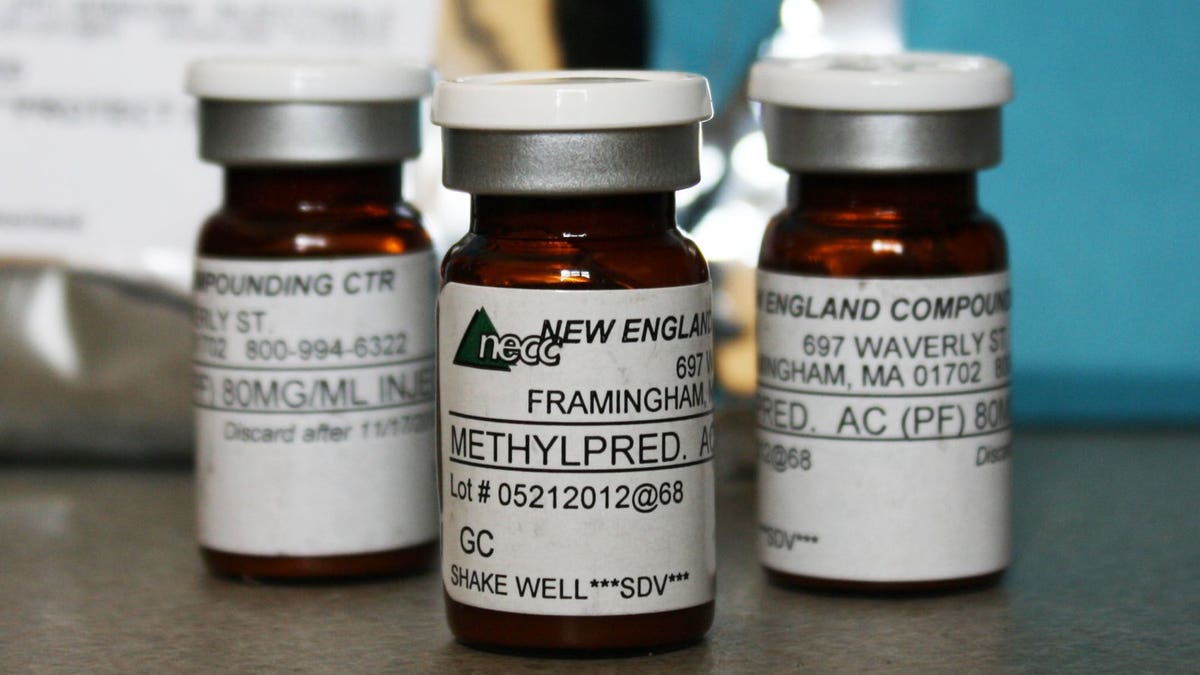
Vials of the injectable steroid product made by New England Compounding Center implicated in a fungal meningitis outbreak. (AP)
State officials said Tuesday they found unclean conditions including visible black specks of fungus in steroids and a leaking boiler near what was supposed to be a clean room at a pharmacy linked to a deadly outbreak of meningitis.
Gov. Deval Patrick said the state has moved to revoke the licenses of the New England Compounding Center and three pharmacists there. He also has ordered the state pharmacy board that oversees similar companies to conduct surprise inspections and take other steps to tighten oversight.
State officials said a preliminary investigation found that the NECC shipped orders from the lots of steroid shots suspected in the outbreak before its own tests came back confirming the lots were sterile. In some cases, they said, drugs went out up to 11 days before test results came back.
Officials also said the company, in Framingham, just west of Boston, operated as a drug manufacturer by producing drugs for broader use, rather than filling out specific prescriptions for specific doctors, which is all its license allowed.
The number of U.S. cases of meningitis from tainted injections of a steroid medication has reached 304, the Centers for Disease Control and Prevention said on Tuesday.
Georgia reported its first case, raising the states covered in the outbreak to 17, the CDC said. Four joint infections from injections of the steroid medication also have been reported, bringing the national total of infections to 308, the CDC said.
There were no new deaths reported, leaving total fatalities in the outbreak at 23 in seven states, the CDC said.
The latest case involves a 66-year-old woman who received an injection of preservative-free methylprednisolone acetate at a clinic in Macon, where she was being treated for back pain.
"The patient is clinically stable, not hospitalized and is under the care of an infectious disease physician," the Georgia Department of Public Health announced in a press release.
New state documents released this week detailed problems an outside firm hired to do an assessment found there years ago.
The state documents, obtained by The Associated Press under a public records request, say investigators in 2006 found inadequate contamination control and no written standard operating procedures for using equipment, among other problems. The problems were corrected that year, and a state inspection in May 2011 as the company prepared to update its facilities found no such issues.
In a letter sent Monday to a lawyer for NECC, the U.S. House Committee on Energy and Commerce sought nearly 10 years of documents about safety and quality issues at the company. It indicated that as far back as 2002 and 2003 officials from the Food and Drug Administration and the state conducted joint probes of the company after receiving a report about a steroid shot.
Those probes preceded a 2004 joint investigation of the center by the FDA and the Massachusetts Board of Registration in Pharmacy.
In January 2006, based on several complaints, the company signed with state regulators a consent agreement in which it agreed to a full inspection of its drug compounding practices by investigators.
The company’s encounters with regulators have been reported since the outbreak began, but state pharmacy board documents released Monday offer a new level of detail. They show the inspection by Illinois-based Pharmaceutical Systems Inc. found “significant gaps” in procedures and a lack of required documentation at the NECC facility.
NECC spokesman Andrew Paven said he hadn’t seen the committee’s letter but the company continues to cooperate with the ongoing investigation.
“NECC worked cooperatively with the Massachusetts Board of Registration in Pharmacy to resolve to the Board’s satisfaction any issues brought to the company’s attention,” he said by e-mail.
NECC's attorney Paul Cirel added, in a written statement: "It has always been the company's practice to provide the Board with full and complete access to its facility and its records. Based on that history, it is hard to imagine that the Board has not been fully apprised of both the manner and scale of the company's operations."
Fox News’ Jonathan Serrie, the AP and Reuters contributed to this report.
